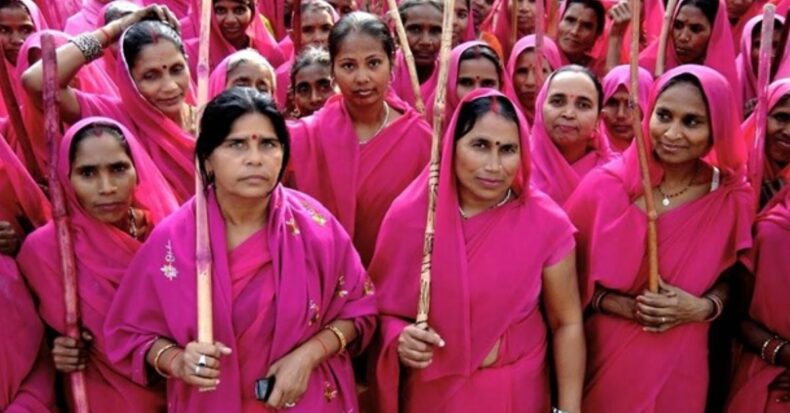No matter how much the men of patriarchal society trying to put women into a category of cranky women, senseless or foolish, that does not affect the spirits of women; they have certainly reached great heights. They seek validation from no one. They no longer ask for their rights; they take charge to make it happen.
“The history of men’s opposition to women’s emancipation is more interesting perhaps than the story of that emancipation itself.” Virginia Woolf
All the older women in society are considered the guardians of ancient traditions and norms. The sole bearer of tolerance to whatever may come, be it dowry demands, domestic violence, or sexual abuse; for generations, they have born it all.
Until 15 years ago, in Uttar Pradesh, India, a woman raised her voice, formed a gang, and charged against the injustice around her. She was Sampat Pal Devi.
Sampat Pal Devi formed a gang called Gulabi pink, where all the women drape pink-clad sarees with lathis in their hands, fighting against the patriarchy and social issues.
The life of a rebel
Her life is very storied. Born in Bundelkhand in the Banda District of Uttar Pradesh in Northern India; A highly caste-ridden, male-dominated society. At the age of 12, she was married off and had to look after the household.
Four years later, at the age of 16, she saw a man relentlessly hitting his wife in the neighborhood. She asked him to stop, but it back-lashed. The next day, she gathered four more ladies along with her, handed them bamboo sticks, and took the matter into their hands.
They hit the man severely, just like he abused his wife. That day, the word spread around in the village; she received several complaints of abuse, dowry demands, discrimination, domestic and sexual violence.
She was infuriated and vouched to fight against all the injustices and wipe the slate clean. This was the first step towards the formation of the Gulabi Gang.
They continued to fight valiantly, sometimes in creative ways to attract attention towards a problem or with lathi for the abusers.
The Gulabi movement
Several years later, when this gang got national recognition, they made their stand effective by giving it a name and uniform: pink-clad saree, the color associated with femininity for decades and hence called the Gulabi Gang.
She started the Gulabi Gang in 2006, accompanied by a few women. In five years, the gang went from ten women in a village to have a few thousand across the state. And today, after 15 years, 400,000 women from the age of 16 to 60 years have joined her in this quest.
Together, they have stopped various child marriages, fought for power supply in her village, forced police to register several domestic violence cases, and raised voices against dowry and female illiteracy.
She empowered Gulabi Gang members with a great sense of belief in their strength. She invoked the true power of women and continues to fight for the rights of women. She is the rebel who took the movement of feminism to the nook and corner of Rural India.
She and her pink sari-clad, lathi-wielding women have beaten up police officers, corrupt bureaucrats, and abusive husbands.
The Gulabi Gang has not only stood up for women, but they have also taken action against social problems. They have protested for better roads, water supply, and power supply as much they have protested for violence against women.
Sometimes, creativity works better than strength
Thokiya, the dreaded dacoit in Bundelkhand, had to be taught a lesson. In 2007, after the Gulabi gang was formed, she ran for the assembly elections as an independent candidate from the Banda district.
The dreaded dacoit would leave turmeric roots on the doorsteps of people’s houses, threatening them to vote his mother or there would be dire consequences.
Sampat Pal Devi won 6,500 votes without campaigning at all.
She says her slogan, “‘Humaara chunav chinh chhadi, Sampat Pal maidaan me khadi. Agar Thokiya karega gadbadi, meri padegi chhadi” (Our symbol is the stick, Sampat Pal’s in the fray; if Thokiya misbehaves, he’ll get a whack) did all the work.
The downfall of the leader
In 2012, she ran again for the Congress from Manikpur district. On a shoe-string budget, she managed to come on the fourth position with 23000 votes.
Since the downfall of Sampat Pal Devi began, she lost the trust of her clan; she was perceived more as a politician, less as a social worker.
In 2014, she was relieved from her role as the head of the Gulabi Gang. She was amidst the allegations of financial impropriety and called out for putting her interest before those of the groups.
She is a feminist who speaks her mind in brash Bundeli and calls herself a ‘sanki soldier’ and a ‘khaasi ladaaku.’ She has left a legacy and continues to fight who inspired several thousand women. She is indeed the epitome of feminism.












